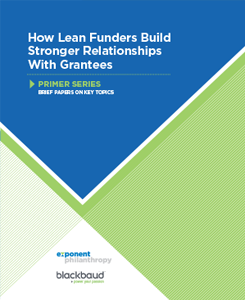
One of our grantees said, the greatest gift you can give another person is trust. Thus, when I started thinking about how to share our experiences with trust-based philanthropy, I first thought about hearing our grantees’ perspectives.
This defines our philanthropic philosophy: working collectively to inspire possibility, innovation and sustainable outcomes.
Engaging in trust-based philanthropy
A few years ago, we transitioned from an entity for tax purposes to a family foundation. We intended to create meaningful impact in our community, and we knew we wanted to focus on relationship building to meet those goals. At the time, we didn’t know the term trust-based philanthropy. However, reflecting on the meaning now, it’s central to our approach.
The foundation started pre-qualifying nonprofits in the community that aligned with our mission to better understand their purpose, business practices, strategic goals, and how they planned to measure their impacts. This allowed us to evaluate our potential compatibility and embark on a true partnership.
Trust-based philanthropy allows organizations to extend beyond a grantor/grantee transaction. By utilizing each group’s skill sets, it becomes a collaboration for community impact.
Giving more than just funds
As a foundation, we believe we have more to give than just a financial contribution. Specifically, by creating a trusting relationship, we can engage in an honest, open and ongoing dialogue. Similarly, we can leverage our human resources, relationships and experiences to better serve the needs of the nonprofits, and ultimately our community.
Our version of trust-based philanthropy has allowed us the opportunity to look beyond traditional outcome measurements, and engage in a collaborative partnership to achieve them. For example, another grantee said:
“Our relationship allows us to learn together and push the limits of what we can deliver. It has fundamentally shifted the focus of our organization from service providers, while challenging our leadership in our strategic priorities. To have a funder believe fully in what we do, and how we do it, is so valuable. We don’t have to constantly prove ourselves each step of the way. We have a partner to strategize with and expand our imagination of what we could do.”
The trust-based philanthropy difference
Trust based philanthropy doesn’t negate the need or expectation for evaluation and accountability with grants. In fact, those processes are still a vital part of the agreement. However, the openness of our grantees is a significant differentiator. This is especially true when things don’t go as planned. We are working with experts in their respective fields, so why wouldn’t we want to get behind them and be their biggest advocates? Meanwhile, we can be a problem solving sounding board for some of the other major challenges community members face.
Undoubtedly, this kind of philanthropy feels amazing. It brings us closer to the front line work and reminds us why we want to be part of the philanthropic community. At the same time, we get to celebrate our grantees’ successes with them. Our grantees feel trust-based philanthropy challenges them, helping better their outcomes. What a gift to our community as a whole.
While we don’t have experience practicing any other kind of philanthropy, we couldn’t imagine an approach devoid of trust, transparency and connectivity. We are grateful for the respect and faith our grantees place in us to engage in trust-based philanthropy.
Ready to build stronger relationships with grantees?
 How Lean Funders Build Stronger Relationships With Grantees
How Lean Funders Build Stronger Relationships With Grantees
Building strong relationships with grantees doesn’t happen overnight. But our research shows that lean funders are well positioned to develop these relationships, and provide more significant support to their nonprofit partners. Learn more >>
About the Author
Corinne Korchinski-Fisher is executive director of the Korchinski Family Foundation. After a decade as an entrepreneur, she transitioned to the non-profit sector to manage her family’s foundation in Saskatchewan, Canada, and to develop the charitable organization in Mexico. She continues to manage her family’s philanthropic endeavors that focus on personal and professional development initiatives to support marginalized persons and families.
